- What is domain authority (DA)?
- Why does domain authority score matters?
- How to check domain authority score?
- Domain Authority vs. Domain Rating vs. Page Authority
- Tips on how to increase your domain authority score
- Improve your domain authority score with effective SEO practises
- Frequently Asked Questions – Domain Authority
- What is domain authority?
- What does domain authority mean?
- How to find domain authority of a website?
- Domain authority checker tool?
- How to increase domain authority?
- What is a good domain authority score?
- How is domain authority calculated?
- Can internal linking help improve domain authority?
- Are backlinks important for increasing domain authority?
“Domain authority”—you’ve probably heard this term countless times, right? But what exactly does it mean, and why is it so important? If you’re still unclear, don’t worry! I’m here to clear things up.
In this blog, I’m going to share in detail what domain authority is, how to check it, and the most effective ways to improve your domain authority score.
On top of that, you’ll learn how a good domain authority score can significantly benefit your SEO efforts and improve your link-building strategy, helping your site attract more traffic and rank higher on search engines.
Let’s get started!
What is domain authority (DA)?
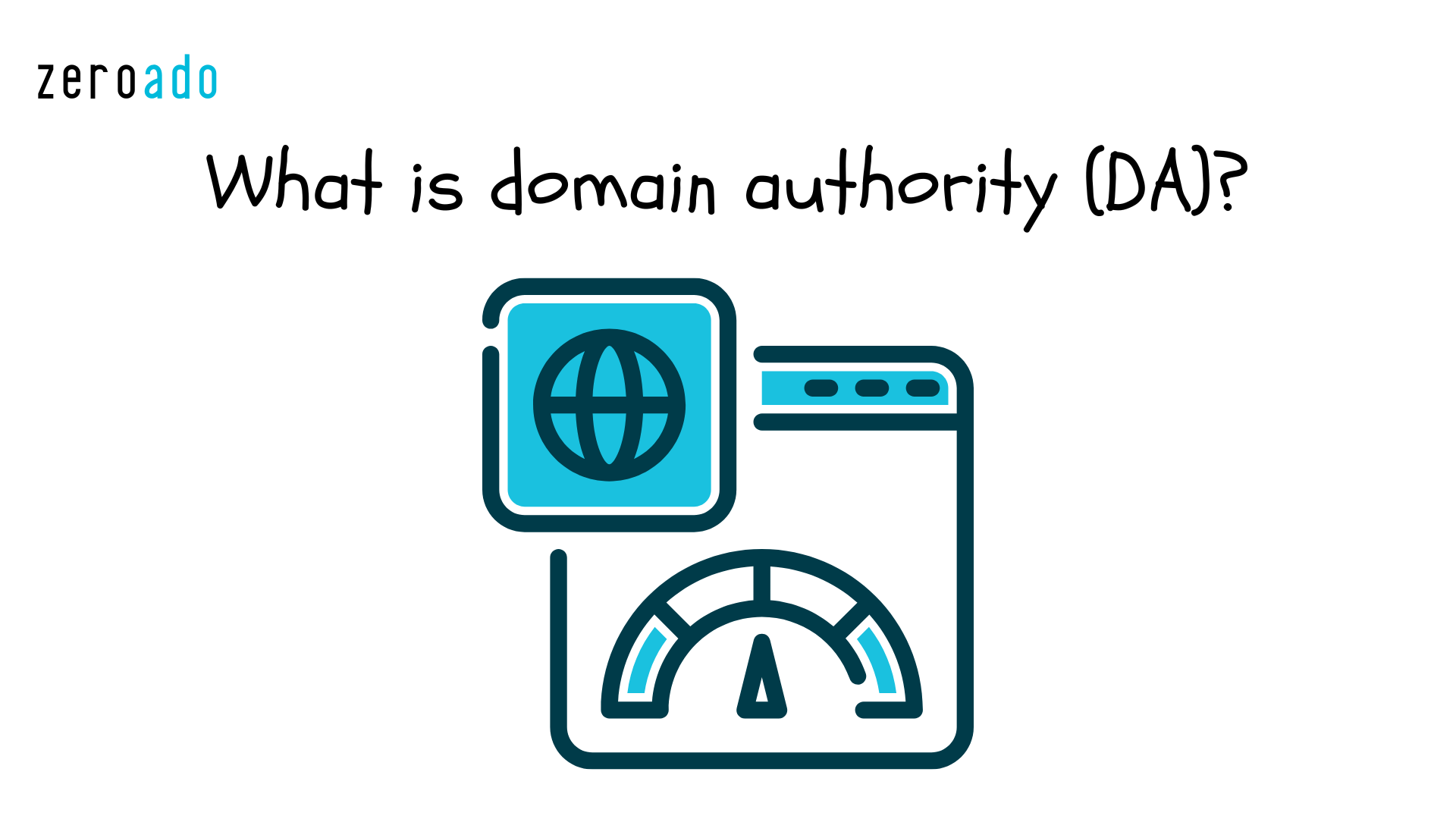
Domain authority (DA) is a score developed by Moz, one of the popular B2B SEO tools, to estimate how well a website might rank on search engines like Google. The score ranges from 1 to 100, with higher numbers meaning your website has a better chance of showing up at the top of search results.
It’s like a reputation score for your website. The higher your score, the more trusted your website appears to search engines, and the more likely it is to rank higher when people search for topics related to your site.
For example, imagine two websites. One is a well-known news site that’s been around for years, and the other is a brand-new blog. The news site likely has a higher domain authority because it has built up a reputation over time with a lot of good SEO content and links from other trusted websites. The new blog will have a lower DA since it’s just starting out.
While DA isn’t something Google directly uses to rank websites, it’s a useful way to measure how strong your website is compared to others (your competitors). The higher your domain authority, the better your chances of appearing higher in search results.
Why does domain authority score matters?
Although domain authority is not a direct ranking factor used by Google—until they were caught in their own lies. Didn’t get it? The recent leak of Google’s search algorithm and the insights drawn from it suggest that domain authority is, in fact, a metric Google considers when ranking your websites and content.
For a long time, Google dismissed domain authority as a ranking factor, but we’ve always suspected that the authority of a website has a significant impact on its visibility. A higher domain authority means better search rankings, more traffic, and ultimately, greater business success.
Your site’s authority can make a real difference in how often it appears in search results and how much traffic it receives.
Here’s why it’s important:
- Competitor comparison: Your domain authority score helps you see how your website measures up against others. A higher score can give you an advantage in search rankings.
- SEO strategy: Keeping an eye on your domain authority is a good way to check if your SEO efforts are working. If your score goes up, it means things like technical SEO, building good links and creating useful content are paying off.
- Link building: Websites with a high domain authority are seen as more trustworthy, making it easier to get other sites to link to yours, which can further improve your site’s authority.
How to check domain authority score?
Checking your website’s domain authority score is quick and easy, thanks to several tools available online. These domain authority checker tools give you an idea of how strong your website is in terms of SEO. Let’s take a look at three popular ones:
Ahrefs
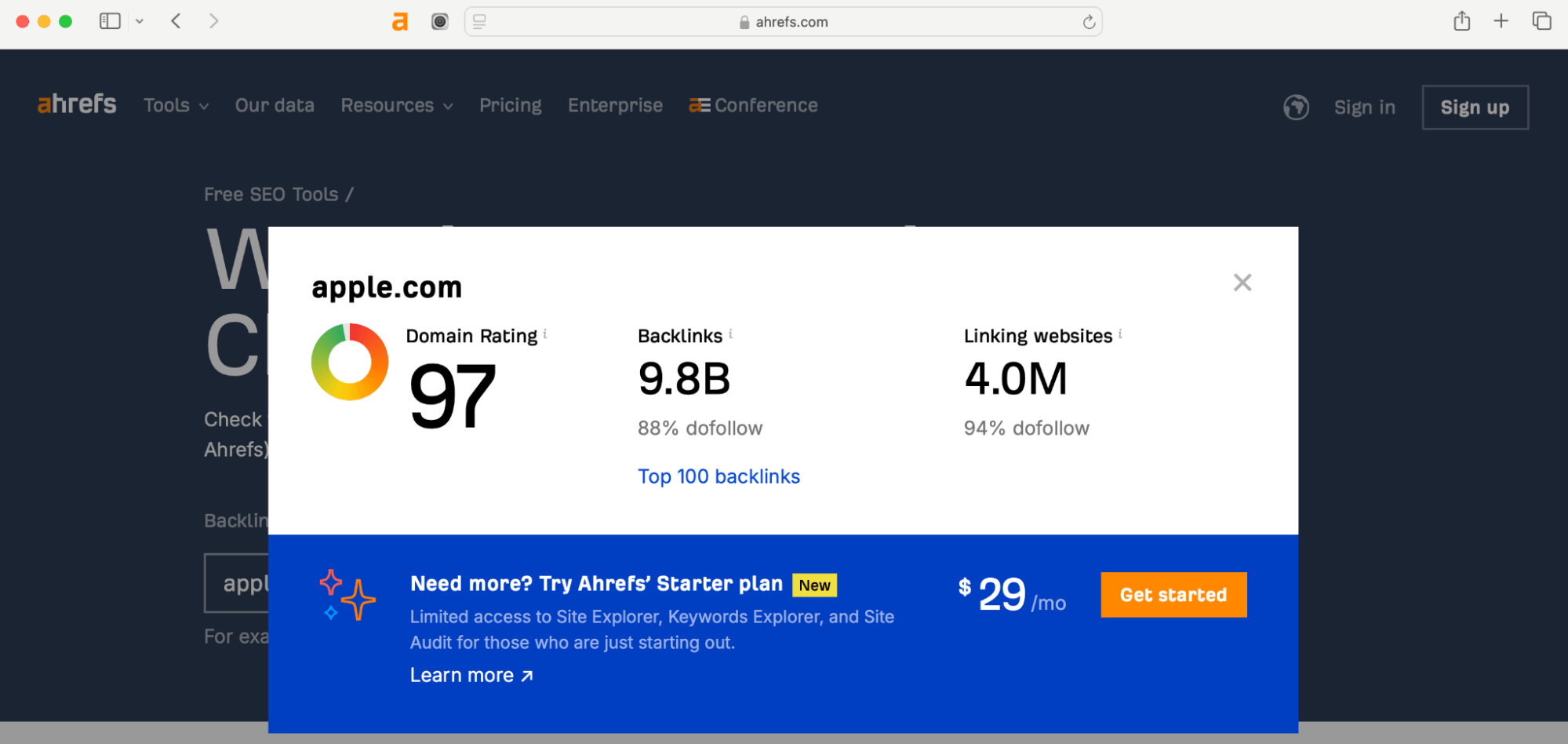
Ahrefs, one of the best SaaS based SEO tools offers a similar metric called domain rating (DR), which is often used and synonymous to domain authority. To check your website’s authority using Ahrefs, you can use the Site Explorer tool. Just enter your URL, and you’ll get detailed reports on your site’s backlinks, organic traffic, and a DR score, which can help you understand how authoritative your website is.
Moz
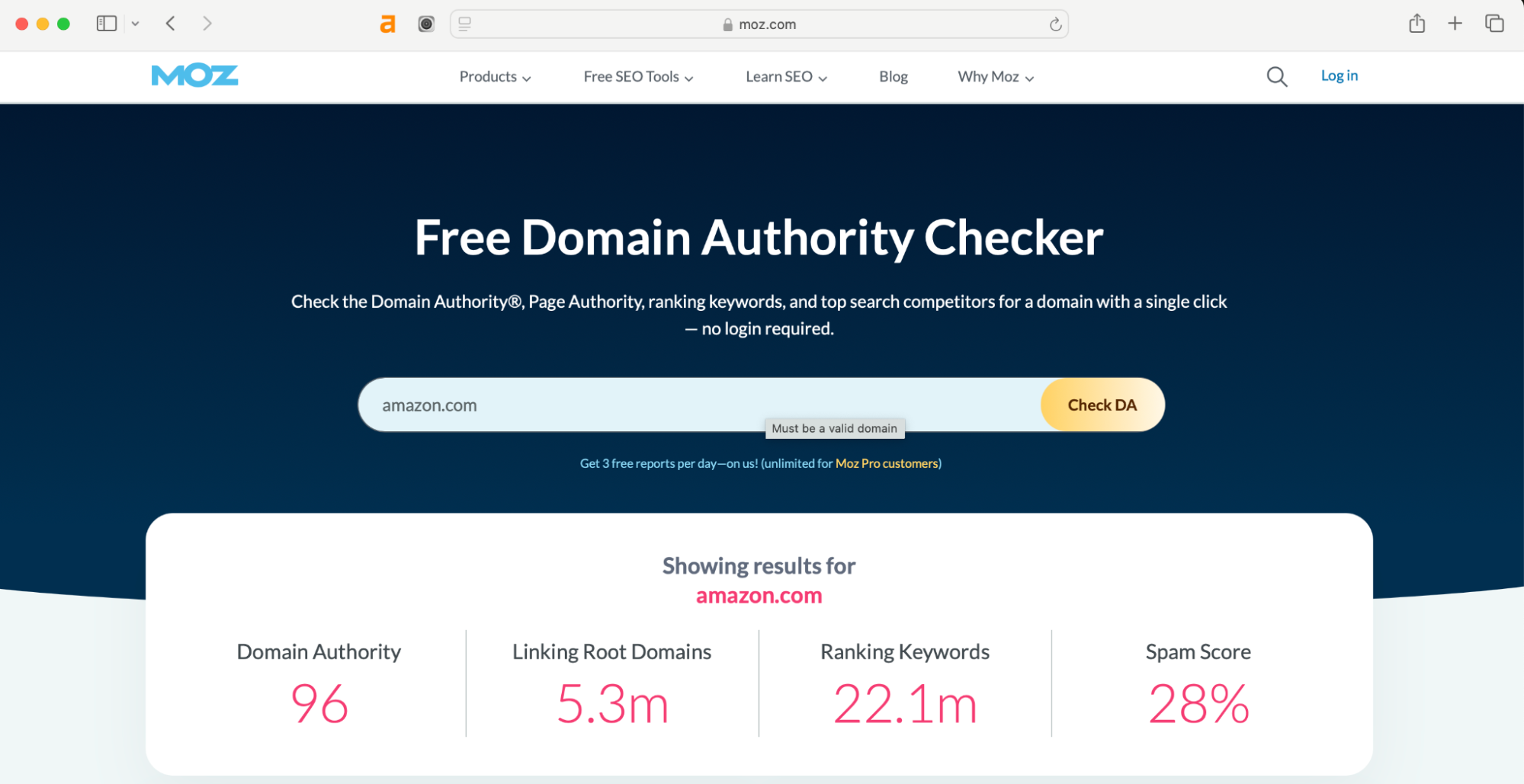
Moz is the original creator of the domain authority metric. You can use Moz’s free domain authority check tool called Link Explorer to check your site’s DA. Simply enter your website URL, and Moz will give you a DA score along with insights like backlinks and top pages. Moz also offers a browser extension called MozBar, which shows you the DA of any website you visit.
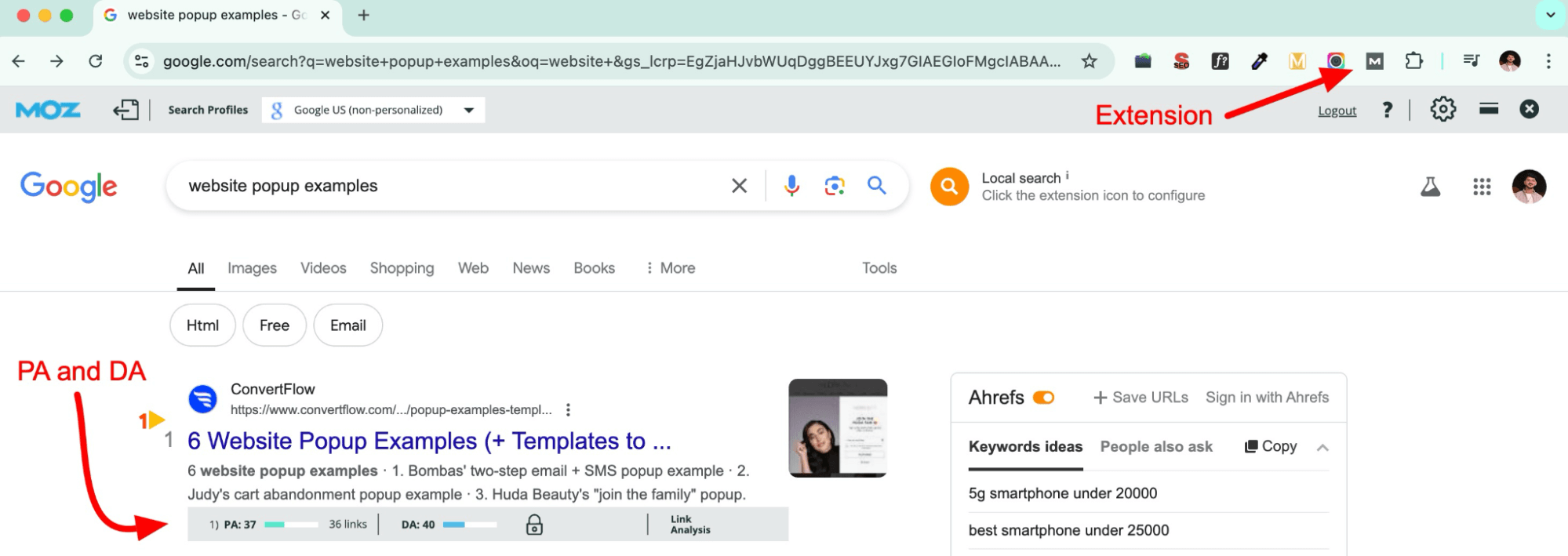
SEMrush
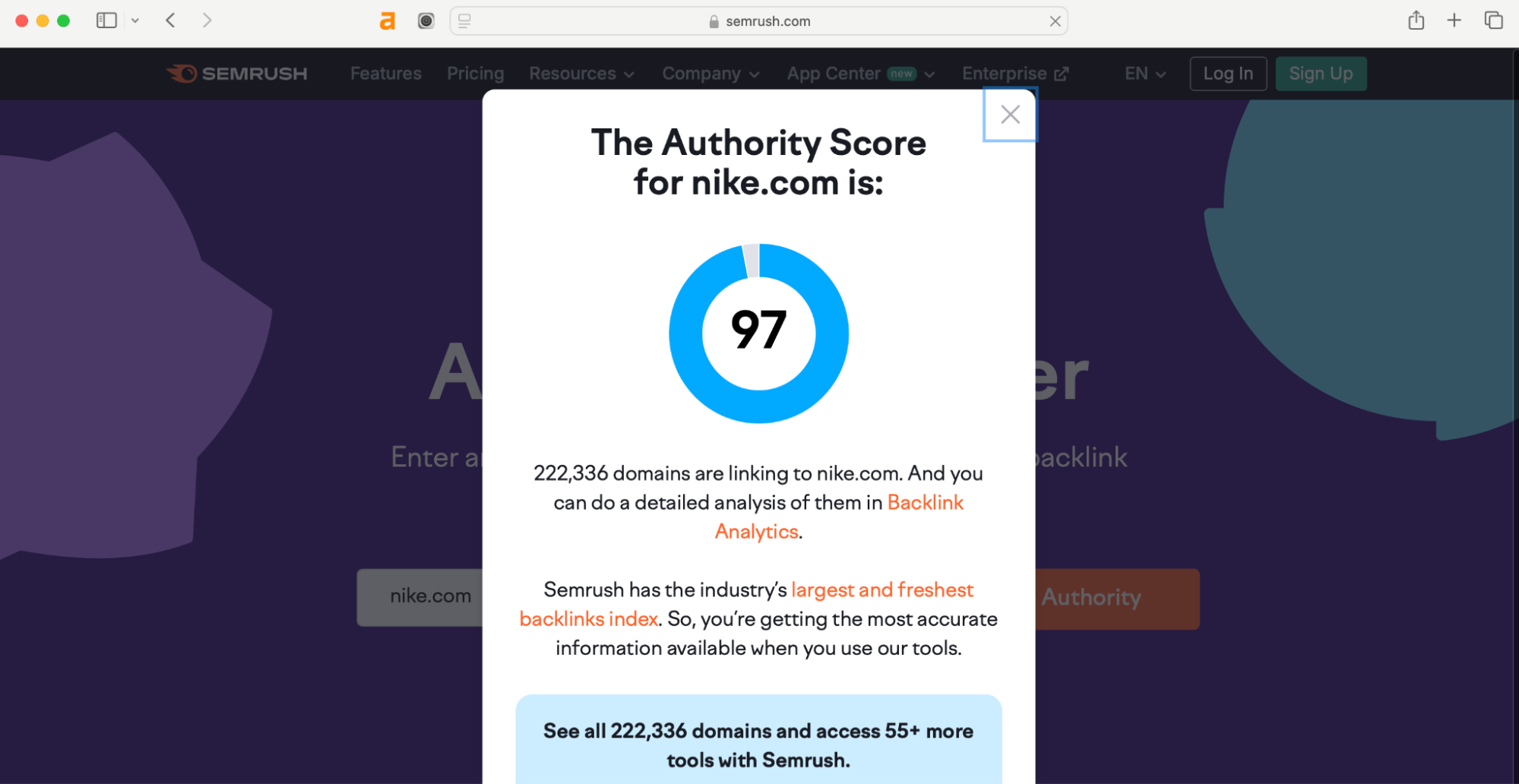
SEMrush is another powerful tool for checking your website’s authority. Using the Authority Score feature in SEMrush, you can check your site’s strength based on its backlinks, organic traffic, and other SEO factors. SEMrush offers a free trial, so you can get access to these metrics even if you’re not a paid user.
Domain Authority vs. Domain Rating vs. Page Authority
While hiring SEO professionals for ZeroAdo, I noticed that many beginner SEOs are often confused by these terms. Even some experienced professionals hesitate when explaining the differences between domain authority, domain rating, and page authority. But understanding these metrics is crucial for building a strong SEO strategy.
Let’s break them down clearly:
Domain Rating vs Domain Authority
Domain rating (DR) and domain authority (DA) are two similar metrics but come from different SEO tools. DR is a metric developed by Ahrefs, while DA comes from Moz. Both measure the strength of a website’s backlink profile and how well it might rank on search engines, but they use slightly different methods to calculate the score.
The key difference is that DR focuses mainly on the quality and quantity of backlinks a website has, while DA takes a broader approach, looking at more factors like the number of linking root domains and other SEO metrics.
Domain Authority vs Page Authority
Domain authority (DA) and page authority (PA) are both metrics developed by Moz, but they measure different things. DA evaluates the overall strength of an entire website, while PA focuses on the strength of an individual page within that site.
For example, a website could have a high DA because it’s well-established and has many backlinks, but certain pages within that site could have higher or lower PA scores depending on how well those specific pages are optimized and linked to by other sites.
Now, let’s dive into the most interesting and important part of this blog—the reason you’re here.
Tips on how to increase your domain authority score
{{video}}
Improving your domain authority score doesn’t happen overnight—it takes time! Don’t expect to see changes just a day after making improvements on your site. It can take weeks or even months to see results, as it requires consistent effort and a strategic approach to SEO. But don’t worry! With patience and the right steps, you’ll get there.
Let’s discuss the key tips to help boost your domain authority one by one:
Create helpful and high-quality content
Just like people need food to survive, SEO needs content to work. SEO and content marketing go hand-in-hand, without good content, it’s hard to succeed in the world of SEO.
You need strong, useful, and engaging content to rank in search engines and bring in organic traffic. Think of content as the fuel that keeps your SEO efforts running. Without it, your SEO won’t go far.
I hope you’re getting what I’m trying to say with the above para’s. But, do you know what are the best practices for creating helpful content? Let’s dive into some key tips:
- Understand your audience: The first step in creating great content is knowing who you’re writing for which we as a content marketer call the ‘target audience’. Understand your target audience’s needs, preferences, and pain points to create content that resonates with them.
- Focus on solving problems: Try to provide answers to questions or solve problems for your audience through your content. Whether by how-to guide or tips on a specific subject.
- Use clear and simple language: Write in a way that is easy for everyone to understand. Avoid jargon (hard words) or complex terms unless it is absolutely necessary, and always aim for clarity.
- Incorporate keywords naturally: Use relevant keywords throughout your content, but make sure they fit naturally within the context. Keyword stuffing can harm readability and SEO performance.
- Keep your content well-structured: Break down your content into sections with clear headings, small paragraphs, bullet points, or numbered lists. This makes it easier for people to read and helps search engines understand your content better.
- Use visuals and examples: Include images, charts, and examples to make your content more engaging and easier to understand. These visual aids help you explain complex ideas and keep readers interested.
- Regularly update your content: Make sure to revisit and update older content to attract traffic and leads while keeping it relevant. SEO trends change over time, and putting fresh content signals to search engines that your site is active and trustworthy.
Build strong backlinks
Now, this is one of the major aspects of domain authority because backlinks play a huge role in improving it. A backlink is when another website links to yours, showing search engines that your site is trustworthy and valuable.
The more high-quality backlinks you have from reputable sites, the more authority your site gains. Think of backlinks like votes of confidence from other websites, each one helps build your credibility and improve your rankings.
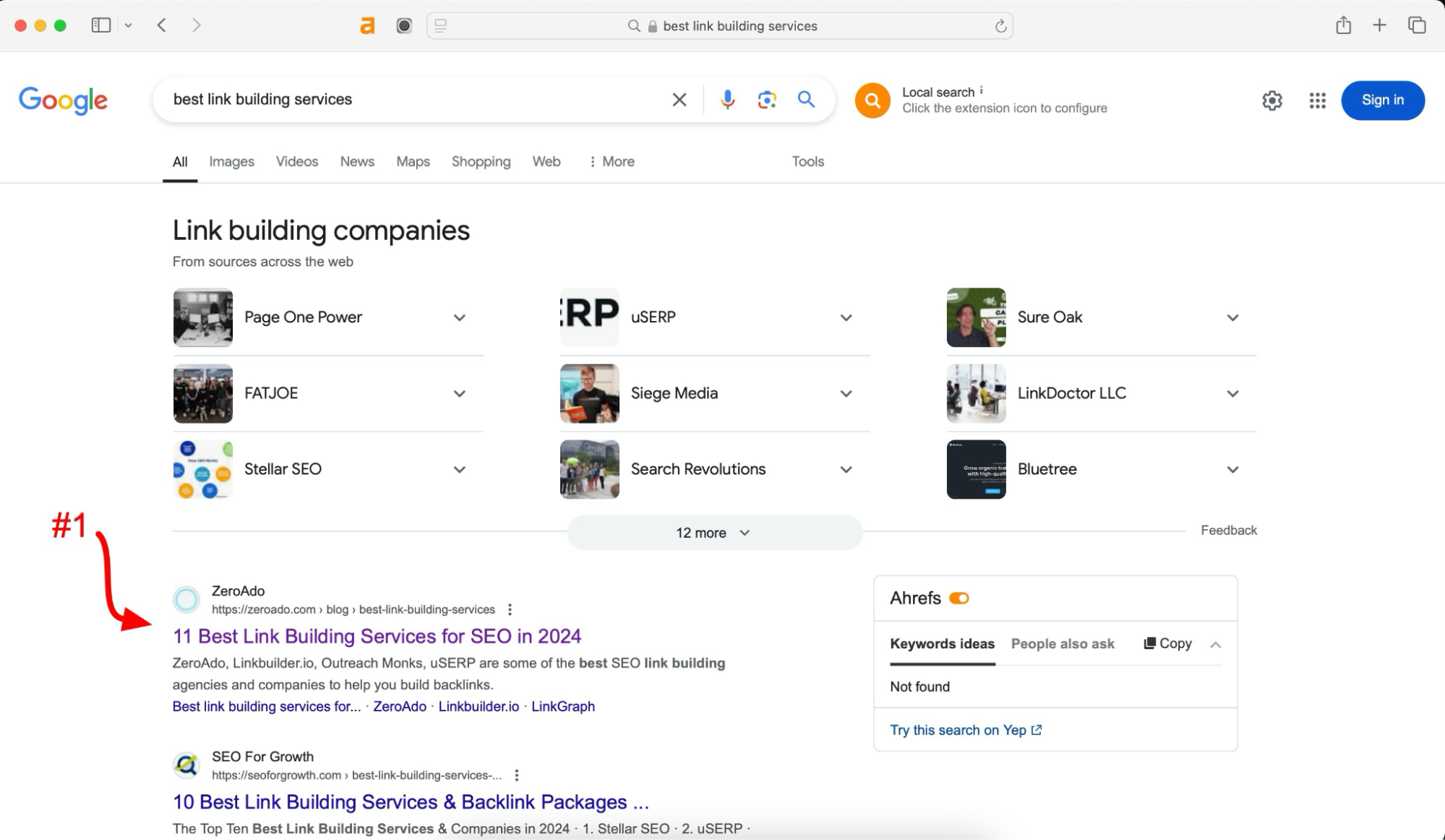
For example, the image above is from Google’s search results, where our blog is ranking at first position for the keyword “best link building services.” Now, you might be thinking, “What’s so special? Blogs often rank for a short time and then drop off.” But let me tell you, we’ve been holding this position for over two months, and we got here in just 2.5 months after the blog was published.
This didn’t happen by chance. It’s the result of consistent effort, starting with keyword research, picking the right keywords, creating helpful, high-quality content, doing SEO copywriting (even for the featured image), and most importantly, building strong backlinks from high domain authority sites. All of this helped us rank and stay at the top.
Optimize your on-page SEO
On-page SEO means improving everything on your website to make it easier for search engines to understand and rank your pages. This includes using the right keywords in your content, titles, and meta descriptions so search engines know what your page is about.
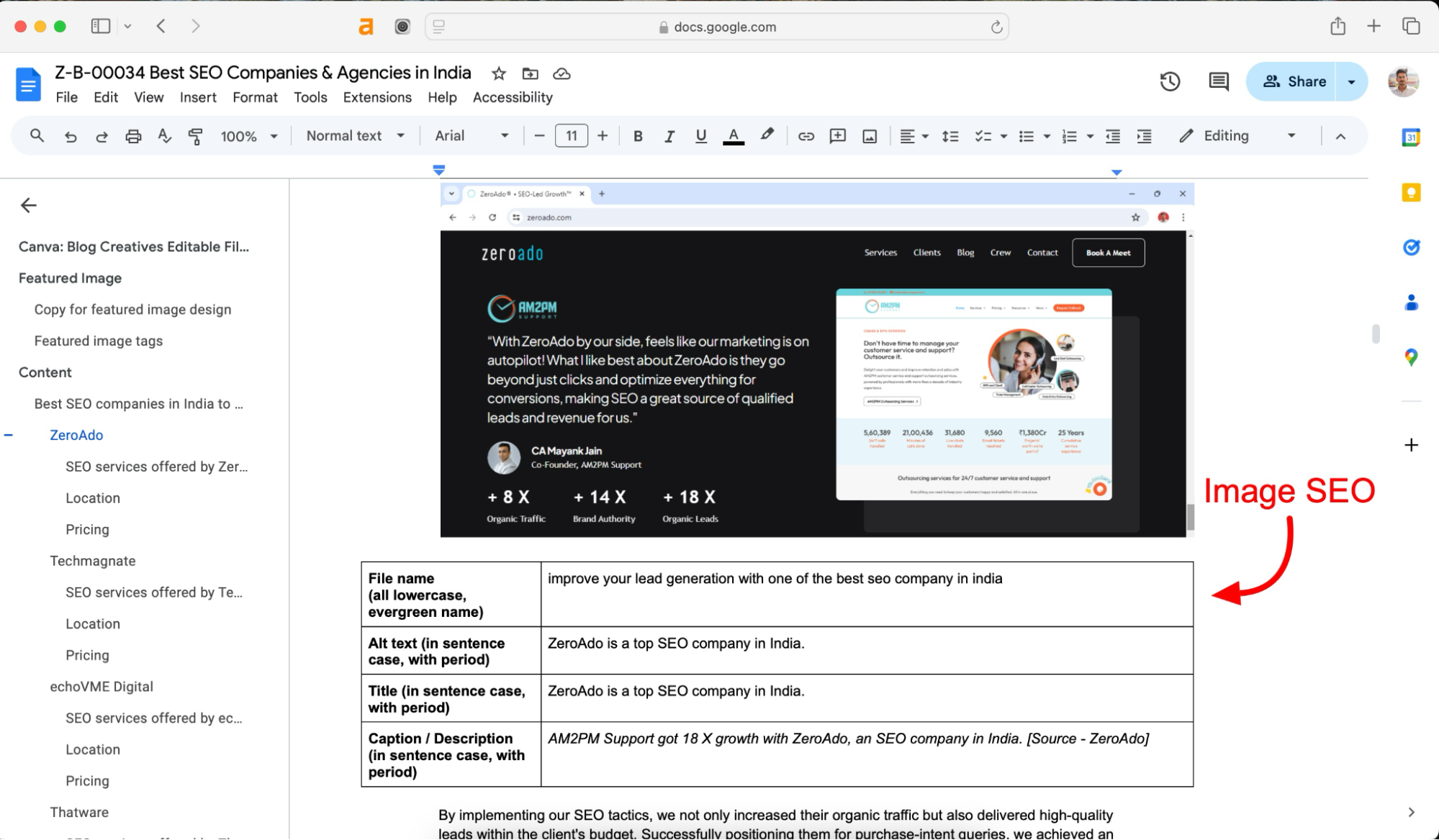
It also means making sure your images have alt text (which helps search engines “see” them), file name, caption and that your site loads quickly, which keeps users happy. Other things like making your site mobile-friendly and creating clear, easy-to-read content are also part of on-page SEO.
When you optimize your website properly, search engines are more likely to rank your pages higher, and over time, this can improve your domain authority.
Improve internal linking
Internal linking (IL) is a powerful, yet often overlooked, SEO strategy that can significantly improve your domain authority. By linking to other relevant pages on your website, you’re helping search engines understand the structure of your site, making it easier for them to crawl and index your content.
This also distributes link equity or link juice (the value or authority that a page passes to another through a link) across your site, which boosts the authority of not just the individual pages you link to but your entire domain.
When you use internal links wisely, you guide visitors to other important pages on your site, which improves user engagement and keeps them on your site longer.
For example, if someone is reading a blog post about SEO companies India, you can link to another article on your site, such as one that explains the top SEO strategies or how to choose the right SEO service. This helps readers discover more of your content, and it also tells search engines that these linked pages are important.
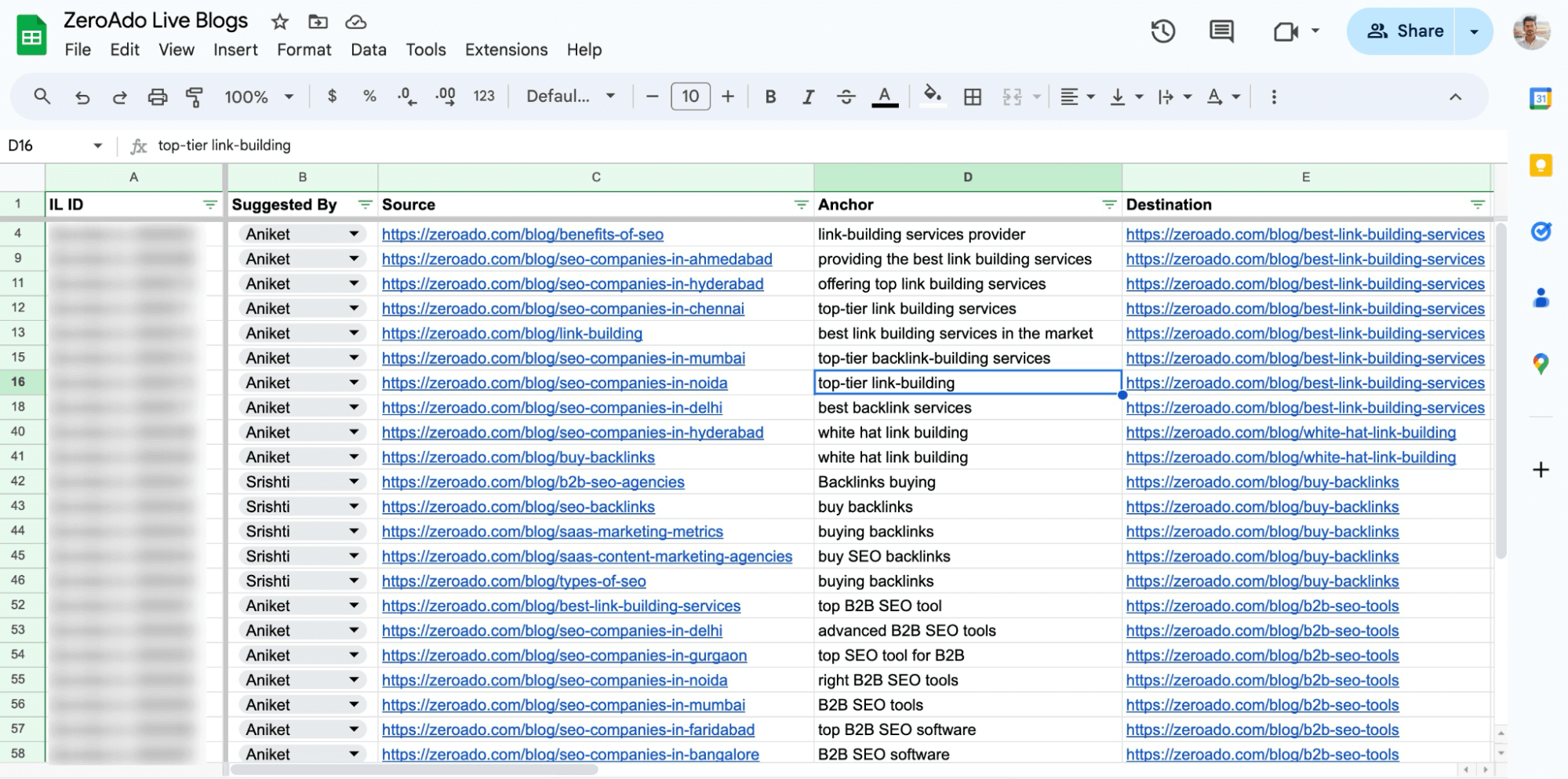
Apart from creating ILs, tracking and regularly auditing your internal links is also important. Over time, pages on your site may be removed or become outdated, and broken links can negatively affect both user experience and your SEO. Fixing or updating these links ensures that your website remains healthy and easy to navigate.
At ZeroAdo, we take this process seriously because we understand the importance of a well-structured internal linking strategy. Above is a screenshot of how we track our internal links.
Remove spam or toxic backlinks
This is the vital step in improving your domain authority score and maintaining a healthy site. Backlinks from low-quality or spammy sites can hurt your reputation with search engines and lower your rankings. These bad links can come from websites that use shady practices or aren’t related to your niche at all.
To find toxic backlinks, you can use tools like Moz, Ahrefs, or SEMrush, which help you see the quality of the links pointing to your site. Once you identify the spammy links, you should disavow them. Disavowing means telling search engines that you don’t want these links to count against your site.
Also, regularly auditing your backlink profile is another key aspect of maintaining your Page Authority. By identifying and disavowing low-quality or spammy PBN backlinks, you can safeguard your site’s reputation and ensure that your link profile remains healthy.
Remember, having a clean backlink profile is essential for improving your domain authority score and improving your chances of ranking higher in search results.
Improve your domain authority score with effective SEO practises
Let’s be honest, increasing your domain authority doesn’t happen overnight. It’s not something that will change just because you made a few updates to your site. Improving your DA takes time, consistent effort, and a strategic approach to SEO.
From creating high-quality content to building strong backlinks and optimizing your on-page SEO, every step contributes to gradually improving your domain authority score. It won’t happen instantly, but with patience and the right strategy, you’ll see long-term results.
If you’re looking for expert help to improve your Domain Authority, ZeroAdo is here to assist you with effective SEO strategies and solutions tailored to your business needs. With a strong Domain Authority score, you’ll attract more leads and traffic to your website.
So what are you waiting for? Reach out to us today!
Frequently Asked Questions – Domain Authority
What is domain authority?
Domain authority (DA) is a score made by Moz that shows how well a website might rank on search engines. The score ranges from 1 to 100, with higher numbers meaning better chances of ranking well. DA takes into account various factors, including the number and quality of backlinks pointing to your site.
What does domain authority mean?
Domain authority is a way to measure how strong and trustworthy your website is according to search engines. A higher DA score means your site is more likely to show up higher in search results compared to others.
How to find domain authority of a website?
You can find the domain authority of a website by using free online tools. Just enter the website’s address into a domain authority checker tool, and it will give you the DA score and some extra details about the site.
Domain authority checker tool?
Yes! There are many tools to check domain authority for free. Some popular options include Moz’s Link Explorer, Ahrefs, and SEMrush. All these allow you to check it for free for a limited number of searches.
How to increase domain authority?
To increase your domain authority, you need to create high-quality content, get good backlinks, improve your on-page SEO, use internal links effectively, update old content, and remove any bad backlinks. These steps will take time but can help boost your DA score.
What is a good domain authority score?
A good domain authority score is usually between 40 and 50 for most websites. Scores above 50 are considered strong. However, it’s important to compare your score with competitors in your niche to understand where your site stands.
How is domain authority calculated?
Domain authority is calculated using different factors like the number and quality of links to your site and how old your domain is. Moz uses a special model to predict how well your site can rank based on these factors.
Can internal linking help improve domain authority?
Yes, internal linking can help your domain authority. By linking to other relevant pages on your site, you can spread the link value throughout your website. This makes it easier for visitors to navigate and can improve your overall SEO.
Are backlinks important for increasing domain authority?
Absolutely! Backlinks are one of the most critical factors in determining your domain authority. Good backlinks from trusted websites show that your content is valuable and trustworthy. The more quality backlinks you have, the more likely your domain authority will increase.

